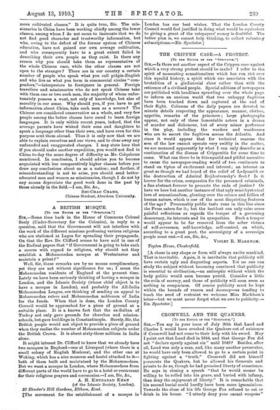THE CRIPPEN CASE.—A PROTEST.
[To THE EDITOR OF TEl " SPECTATOR:1 Sr,—Is there not another aspect of the Crippen case against which a very strong protest should be made? I refer to the spirit of nauseating sensationalism which has run riot over this squalid history, a spirit which one associates with the brutalities of a gladiatorial show rather than with the reticence of a civilised people. Special editions of newspapers are published with headlines sprawling over the whole page to inform an anxious world that two unhappy fugitives have been tracked down and captured at the end of their flight. Columns of the daily papers are devoted to minute details respecting the appearance, manner, clothes, appetite, remarks of the prisoners ; large photographs appear, not only of these lamentable actors in a drama of murder and dishonour, but of every minor performer in the play, including the warders and wardresses who are to escort the fugitives across the Atlantic. And since it would appear that for technical reasons the arm of the law cannot operate very swiftly in the matter, we are menaced apparently by what I can only describe as a continuation of the disease of Crippenitis for some time to come. What can there be in this squalid and pitiful narrative to cause the newspaper-reading world of two continents to stand on tiptoe of excitement and interest ; an interest as great as though we had heard of the relief of Ladysmith or the destruction of Admiral Rojdestvensky's fleet ? Is it horror for the crime, compassion for the presumed criminals, a fine abstract fervour to promote the ends of justice ? Or have we here but another instance of that ugly semi-hysterical love of sensationalism, gloating over the crimes and follies of human nature, which is one of the most disquieting features of the age ? Presumably public taste runs in this line since the Press caters for it; but the incident can only raise some painful reflections as regards the temper of a governing democracy, its interests and its sympathies. Such a temper would appear to be far removed from the sober virtues of self-reverence, self-knowledge, self-control, on which, according to a great poet, the sovereignty of a sovereign people must rest.—I am, Sir, Ste.,
Tapton House, Chesterfield.
VIOLET R. MARICHAlif.
[A chase in any shape or form will always excite mankind. That is inevitable. Again, it is inevitable that publicity will have certain ugly and disgusting aspects. Yet no one can study the subject without becoming convinced that publicity is essential to civilisation,—an antiseptic without which the body politic would soon become putrid. Consider a little the evils of secrecy, and those of publicity will soon seem as nothing in comparison. Of course publicity must be kept within the bounds of reason and decency—as tending to teach the need of restraint we welcome Miss Markham's letter—but we must never forget what we owe to publicity.—. ED. Spectator.]






































 Previous page
Previous page